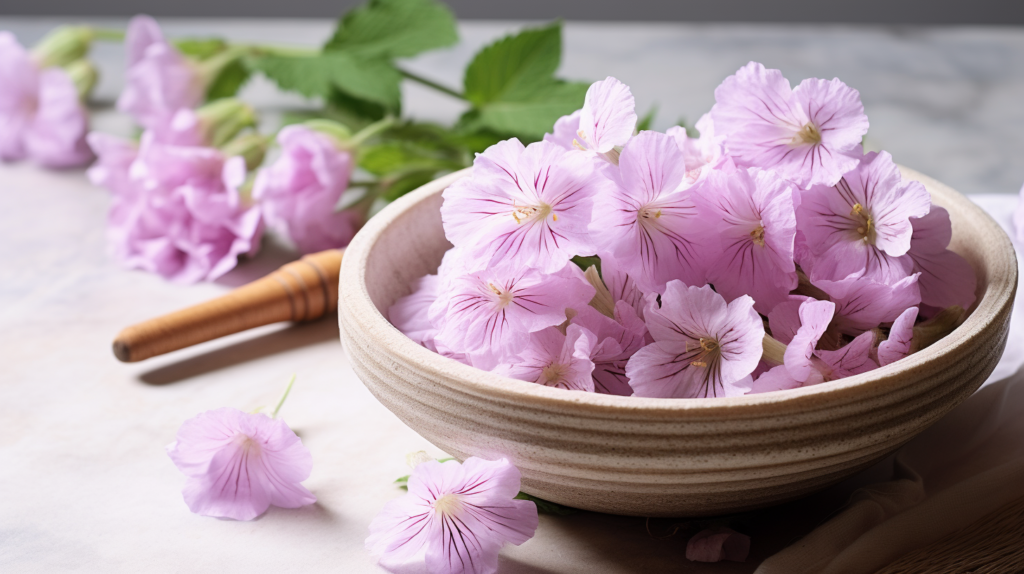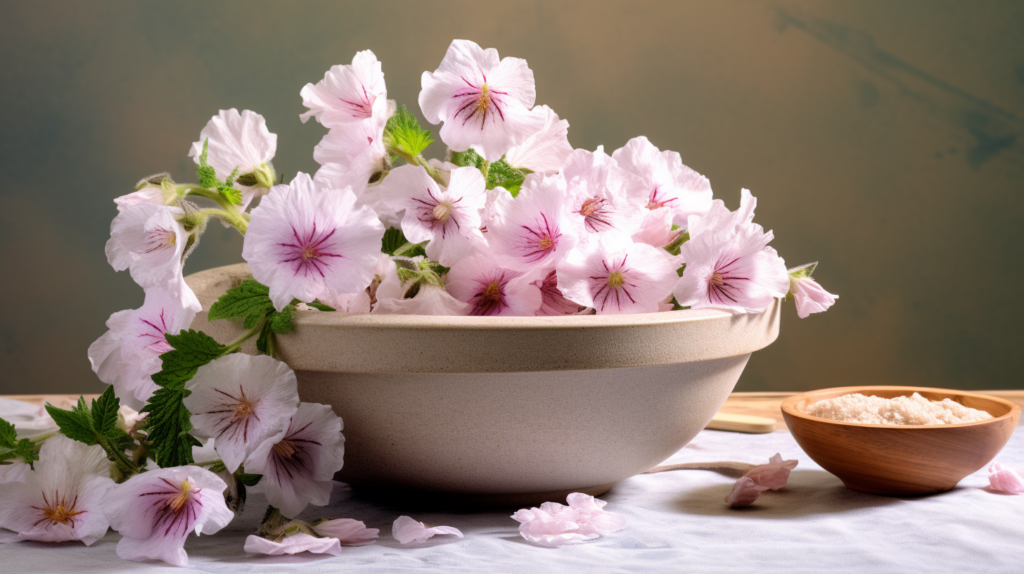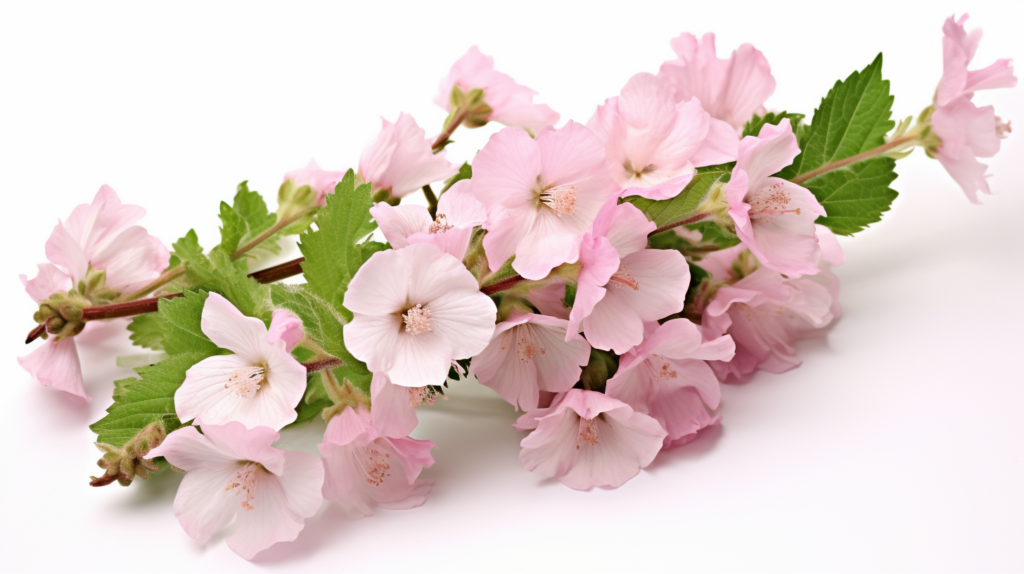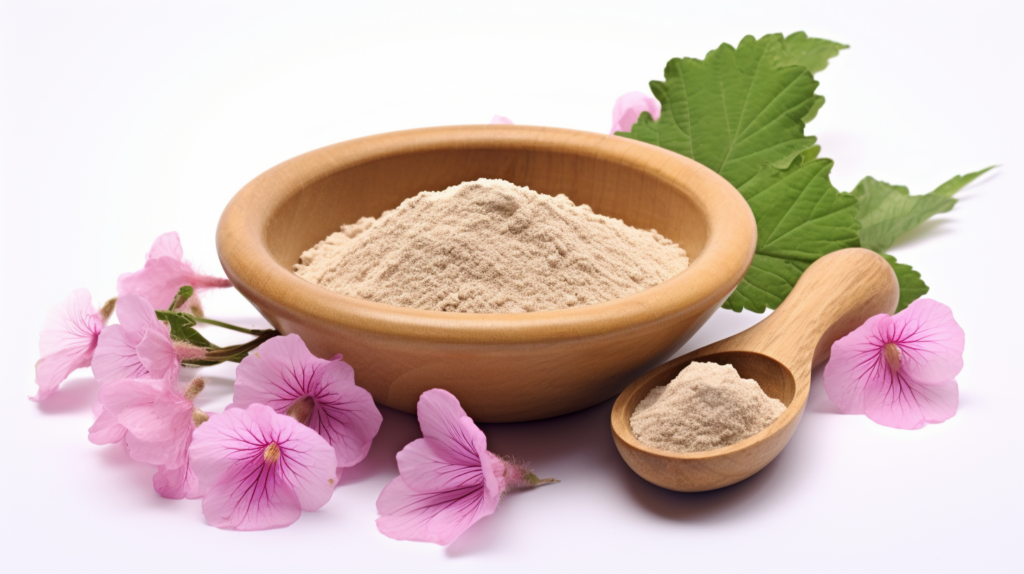If you’re someone who suffers from sore throats or ulcers, you know all too well how uncomfortable and painful they can be. Fortunately, there’s a natural remedy that can provide relief: marshmallow root.
Marshmallow root has been used for centuries to soothe various ailments, including sore throats and ulcers. This powerful herb contains compounds that have anti-inflammatory and antimicrobial properties, making it an excellent natural remedy for these types of conditions.
Key Takeaways:
- Marshmallow root has natural abilities to soothe sore throats and ulcers.
- It has been used for centuries to treat various ailments.
- Marshmallow root has compounds that have anti-inflammatory and antimicrobial properties.

Understanding the Benefits of Marshmallow Root
Marshmallow root has been used for centuries as a natural remedy for various ailments. Its health benefits are attributed to its high content of mucilage, a thick, gluey substance that coats and soothes the digestive tract and respiratory system.
The Many Uses of Marshmallow Root
Marshmallow root has a broad range of uses, from digestive health to respiratory ailments and beyond. Among its many benefits, marshmallow root can:
- Soothe irritated mucous membranes in the mouth and throat
- Relieve coughs and respiratory infections
- Reduce inflammation and pain caused by digestive issues such as ulcers and GERD
- Support healthy skin and hair
Marshmallow root is also rich in antioxidants and other nutrients that help to boost overall health and wellbeing.
Using Marshmallow Root for Digestive Health
Marshmallow root has long been used to soothe digestive issues such as ulcers, GERD, and irritable bowel syndrome. Its mucilage content forms a protective layer over the digestive tract, reducing inflammation and promoting healing.
To use marshmallow root for digestive health:
- Steep 1-2 teaspoons of dried marshmallow root in a cup of hot water for 10-15 minutes
- Strain and drink the tea
- Repeat up to three times per day as needed
Marshmallow root can also be taken in supplement form, either alone or in combination with other digestive health supplements.
Using Marshmallow Root for Respiratory Health
Marshmallow root is effective in soothing respiratory ailments such as coughs, colds, and bronchitis. Its mucilage content coats and soothes irritated mucous membranes, reducing inflammation and promoting healing.
To use marshmallow root for respiratory health:
- Steep 1-2 teaspoons of dried marshmallow root in a cup of hot water for 10-15 minutes
- Strain and drink the tea
- Add honey or lemon for added benefits
- Repeat up to three times per day as needed
Marshmallow root can also be added to a steam inhalation mixture to help soothe respiratory issues.
Other Uses of Marshmallow Root
Marshmallow root can also be used topically to soothe skin irritations such as eczema and psoriasis. Its anti-inflammatory properties reduce redness and swelling, while its hydrating properties help to moisturize the skin.
Marshmallow root can also be used to promote healthy hair growth and reduce hair breakage. Its high mucilage content softens and detangles hair, making it easier to manage and style.
Incorporating marshmallow root into your daily routine can provide numerous health benefits. Whether you prefer tea, supplements, or topical applications, there are many ways to reap the rewards of this versatile herb.

Soothing Sore Throats with Marshmallow Root
If you are experiencing a sore throat, marshmallow root can provide natural relief. Used for centuries as a traditional medicine, marshmallow root has anti-inflammatory and antimicrobial properties that can soothe irritation and discomfort in your throat.
There are several natural remedies that can be made with marshmallow root to alleviate sore throats. One effective method is to make a marshmallow root tea. To make the tea, steep one tablespoon of dried marshmallow root in hot water for at least 15 minutes. You can also add honey or lemon to the tea for additional soothing benefits.
Another way to use marshmallow root to alleviate sore throats is through a marshmallow root gargle. To make a gargle, mix one tablespoon of dried marshmallow root with one cup of hot water. Let the mixture cool, then gargle for at least 30 seconds before spitting it out.
Marshmallow root can also be used in lozenges or cough syrups to alleviate coughing and throat irritation. When combined with other soothing herbs such as licorice root and slippery elm bark, marshmallow root can provide even greater relief.
It is important to note that while marshmallow root is generally considered safe, it may interact with certain medications or cause side effects in some individuals. Consult with a healthcare professional before using marshmallow root as a natural remedy.
Marshmallow Root Remedies for Sore Throats
| Remedy | Instructions |
|---|---|
| Marshmallow root tea | Steep 1 tablespoon of dried marshmallow root in hot water for at least 15 minutes. Drink while warm. |
| Marshmallow root gargle | Mix 1 tablespoon of dried marshmallow root with 1 cup of hot water. Let cool and gargle for at least 30 seconds before spitting out. |
| Marshmallow root lozenges | In a bowl, mix 1 tablespoon of powdered marshmallow root, 1 tablespoon of slippery elm bark powder, and 1 tablespoon of honey. Roll into small balls and let dry before consuming. |
Marshmallow root is a natural and effective remedy for soothing sore throats. Incorporating it into your daily routine can provide relief and improve your overall wellbeing.
Marshmallow Root for Ulcer Relief
If you suffer from ulcers, marshmallow root may provide a natural solution to your discomfort. Marshmallow root contains mucilage, a thick, sticky substance that can soothe and protect the lining of the digestive tract. This can be especially helpful for those with ulcers, as the mucilage can create a barrier between the ulcer and stomach acid, allowing the ulcer to heal without further irritation.
One of the most common ways to use marshmallow root for ulcer relief is by making a tea. To prepare marshmallow root tea, simply add 1 tablespoon of dried marshmallow root to a cup of boiling water. Allow the mixture to steep for 10-15 minutes before straining and drinking. You can drink this tea up to 3 times per day, as needed.
Another way to use marshmallow root for ulcer relief is by adding it to your diet. You can add powdered marshmallow root to smoothies, yogurt, or oatmeal for a nutritional boost. This can help promote digestive health and provide additional relief for ulcers.
Note: It is important to consult with a healthcare professional before using any natural remedies, especially if you are currently taking medication or have any underlying health conditions.
While marshmallow root is generally considered safe, some individuals may experience side effects such as nausea or diarrhea. It is important to start with a small dose and gradually increase to assess tolerance. If you experience any adverse effects, discontinue use and consult with a healthcare professional.
If you are looking for a natural way to alleviate ulcer symptoms, marshmallow root may be worth trying. Its soothing properties can help promote healing and provide relief from discomfort.

Harnessing the Power of Marshmallow Root in Tea Form
Marshmallow root tea is a popular and delicious way to enjoy the health benefits of this natural remedy. This herbal tea is made from the dried root of the marshmallow plant, and is known for its soothing properties for the throat and digestive system.
To prepare marshmallow root tea, simply place a tablespoon of dried marshmallow root in a cup of hot water. Allow the tea to steep for at least 10 minutes, and then strain out the solids before drinking. You can sweeten the tea with honey or add lemon for an extra boost of vitamin C.
Marshmallow root tea can be enjoyed at any time of day, and is a great way to support your overall health and wellbeing. Its anti-inflammatory and antioxidant properties make it an ideal choice for promoting digestive and respiratory health.
In addition to its benefits for sore throats and ulcers, marshmallow root tea has been used for centuries to support healthy skin and hair. It can be applied topically or ingested to improve the overall health and appearance of skin and hair.
When purchasing marshmallow root tea, be sure to choose high-quality, organic products from reputable sources. Look for teas that contain only pure, dried marshmallow root with no added ingredients or preservatives.
Whether you are using marshmallow root tea for its health benefits or simply for its delicious taste, this natural remedy is a great addition to any daily routine.

Unlocking the Potential of Marshmallow Root Extract
Marshmallow root extract is a highly concentrated form of the plant’s healing properties. It’s commonly used in hair care products due to its ability to nourish and promote healthy hair growth.
The extract is rich in mucilage, a natural emollient that coats and protects hair strands, improving their elasticity and strength. Mucilage also has detangling properties that help to prevent breakage and split ends.
Marshmallow root extract is also a natural conditioner, leaving hair feeling soft, shiny, and smooth. It can help to soothe an itchy or irritated scalp, reducing inflammation and promoting healthy blood flow to the hair follicles.
When using marshmallow root extract in your hair care routine, look for products that contain the extract high up on the ingredient list. This ensures that the product contains a significant amount of the extract.
You can also make your own hair care products using marshmallow root extract. Simply steep marshmallow root in hot water to create a tea, then mix it with your favorite hair oil or conditioner for a natural DIY treatment.
Incorporating Marshmallow Root into Your Daily Routine
If you’re interested in reaping the health benefits of marshmallow root, there are many ways to incorporate it into your daily routine. Here are some practical tips and suggestions:
1. Try Marshmallow Root Tea
Marshmallow root tea is a popular and easy way to consume this herbal remedy. To make the tea, simply steep 1-2 teaspoons of dried marshmallow root in a cup of hot water for 10-15 minutes. You can drink it plain or add honey or lemon for flavor. Drink this tea up to three times a day for maximum benefits.
2. Use Marshmallow Root Topically
Marshmallow root can also be used topically to soothe skin irritations, such as eczema or psoriasis. To make a poultice, mix marshmallow root powder with water to create a thick paste. Apply the paste to the affected area and cover with a clean cloth or bandage. Leave the poultice on for several hours or overnight.
3. Add Marshmallow Root to Your Diet
You can also add marshmallow root to your diet by using it as a natural thickener for soups, stews, and sauces. Simply simmer the root in water until it becomes a thick gel-like substance, then add it to your dish. Marshmallow root can also be added to smoothies or mixed with hot cereal in the morning for a healthy breakfast.
4. Consider Taking Marshmallow Root Supplements
If you’re looking for a more convenient way to consume marshmallow root, you can also take it in supplement form. Marshmallow root supplements are available in capsule or liquid form and can be found at most health food stores. Follow the recommended dosage on the label and consult with your healthcare provider before taking any supplements.
Incorporating marshmallow root into your daily routine can provide numerous health benefits, including soothing sore throats and ulcers, promoting digestive health, and improving overall wellbeing. Whether consumed as a tea, used topically, or added to your diet, marshmallow root is a natural remedy worth exploring.

The Science Behind Marshmallow Root’s Healing Properties
Marshmallow root has been used for centuries as a natural remedy for various ailments, including sore throats and ulcers. But what exactly makes this herb so effective?
The healing properties of marshmallow root can be attributed to its high mucilage content. Mucilage is a type of thick, gooey substance that is produced by certain plants and has a soothing effect on the body.
When marshmallow root is consumed, the mucilage coats the throat and digestive tract, providing a protective layer that helps to ease inflammation and irritation. Additionally, the mucilage can help to hydrate the body by retaining water, which is especially beneficial for individuals with dry coughs or dry skin.
In addition to its high mucilage content, marshmallow root also contains a variety of other compounds that contribute to its healing properties. These include flavonoids, phenolic acids, and polysaccharides.
Flavonoids are a type of antioxidant that can help to reduce inflammation and improve overall health. Phenolic acids are another type of antioxidant that can help to protect the body against damage from free radicals. Polysaccharides are complex carbohydrates that can help to boost the immune system and support gut health.
Research has also shown that marshmallow root may have antibacterial and antiviral properties, which can help to fight off infections and promote overall wellness.
Overall, the combination of mucilage, flavonoids, phenolic acids, and polysaccharides make marshmallow root a powerful natural remedy for a variety of health concerns. Whether you are looking to soothe a sore throat, alleviate ulcers, or simply support your overall wellbeing, marshmallow root is a versatile and effective herb to consider.
Precautions and Potential Side Effects of Marshmallow Root
Marshmallow root is generally considered safe for consumption and topical use, with no serious side effects reported. However, as with any herbal remedy, it is recommended to exercise caution and seek medical advice before use, particularly in certain circumstances.
Precautions
If you are pregnant or breastfeeding, it is advised to consult with a healthcare professional before using marshmallow root. It is also recommended to consult with a healthcare professional before use if you have diabetes, as marshmallow root may lower blood sugar levels.
Marshmallow root may also interact with certain medications, such as blood thinners and diuretics. If you are taking any medications, it is important to consult with a healthcare professional before using marshmallow root.
Potential Side Effects
In rare cases, marshmallow root may cause mild allergic reactions, such as skin irritation or rash, when used topically. When consumed orally, marshmallow root may cause mild digestive discomfort, such as bloating or gas.
If you experience any adverse effects after using marshmallow root, discontinue use and consult with a healthcare professional.
Overall, marshmallow root is a safe and natural remedy for various health conditions, including sore throats, ulcers, and digestive complaints. If used responsibly and with proper precautions, you can enjoy the numerous health benefits of this versatile herb.

Exploring Alternative Herbal Remedies for Sore Throats and Ulcers
While marshmallow root is a powerful natural remedy for sore throats and ulcers, there are several other herbal remedies that can be used in conjunction with it to enhance its healing properties. Here are some additional natural remedies to consider:
- Slippery elm: Like marshmallow root, slippery elm contains mucilage, which can help soothe irritated mucous membranes in the throat and stomach. You can find slippery elm in powder or capsule form or as a tea.
- Chamomile: Chamomile has anti-inflammatory properties that can help reduce swelling and soothe sore throats. It is available in tea or capsule form.
- Echinacea: Echinacea is a natural immune booster that can help fight off the underlying infection that may be causing a sore throat or ulcer. It can be found in capsule or tincture form.
- Peppermint: Peppermint contains menthol, which can help numb the throat and reduce pain. It is available as a tea or essential oil.
It is important to note that while herbal remedies can be effective for treating sore throats and ulcers, they should not be relied upon as a substitute for medical treatment in severe cases. Always consult with your doctor before using any natural remedies, especially if you have a pre-existing medical condition or are taking medication.

Conclusion
Congratulations on learning about the numerous health benefits of marshmallow root. By incorporating this natural remedy into your daily routine, you can soothe sore throats, alleviate ulcers, promote healthy digestion and respiratory function, nourish your hair and improve your overall wellbeing.
Remember to consult with your healthcare provider before using marshmallow root as a remedy, especially if you are pregnant, breastfeeding or taking medications.
Take Action and Try Marshmallow Root Today
Whether you choose to consume marshmallow root as a tea or supplement, add it to your meals or use it topically, there are many ways to take advantage of its health benefits. Select high-quality marshmallow root products, follow recommended dosages and enjoy the many ways this natural remedy can support your health.
Explore Herbal Remedies for Even More Benefits
In addition to marshmallow root, there are many other herbal remedies that can provide further relief for sore throats and ulcers. Consider trying herbs such as licorice root, echinacea, ginger, slippery elm and chamomile in combination with marshmallow root to amplify its benefits and improve your health.
We hope that this article has been informative and useful in educating you on the many benefits of marshmallow root. By taking advantage of this natural remedy, you can improve your health and wellbeing in a safe and effective way.
FAQ
Q: What are the health benefits of marshmallow root?
A: Marshmallow root has numerous health benefits, including soothing sore throats, relieving digestive issues, promoting respiratory health, and improving overall wellbeing.
Q: How does marshmallow root soothe sore throats?
A: Marshmallow root contains mucilage, a gel-like substance, that coats the throat and provides a soothing effect. It can help alleviate pain and reduce inflammation associated with sore throats.
Q: Can marshmallow root be used for ulcer relief?
A: Yes, marshmallow root can be used as a natural remedy for ulcers. It has anti-inflammatory properties and helps protect the stomach lining, promoting healing and reducing discomfort.
Q: How can marshmallow root be consumed?
A: Marshmallow root can be consumed in various forms, such as tea, capsules, or tinctures. It can also be used topically in creams or ointments for skin-related issues.
Q: Are there any precautions or side effects associated with marshmallow root?
A: While marshmallow root is generally safe, some individuals may experience allergic reactions or digestive discomfort. It is advisable to consult with a healthcare professional before using marshmallow root, especially if you have any existing medical conditions or are taking medications.
Q: Can marshmallow root be combined with other herbal remedies?
A: Yes, marshmallow root can be combined with other herbal remedies to enhance its effectiveness. Some herbal remedies that complement marshmallow root for sore throats and ulcers include licorice root and slippery elm.
Q: What are some recommended marshmallow root products?
A: There are various high-quality marshmallow root products available on the market, including organic marshmallow root tea, marshmallow root capsules, and marshmallow root extract. Look for products that are sourced from reputable sources and have positive customer reviews.














